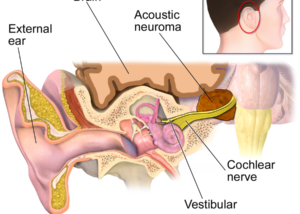An acoustic neuroma is a slow growing brain tumor that, if not caught earlier, can start affecting nerves that involve the face.
The nerve that controls facial function is not the same as the one that controls the tongue.
Is it possible – even remotely — for an acoustic neuroma to affect tongue function?
“It is very rare for an acoustic neuroma to affect the tongue unless it is very large and extends lower in the intracranial cavity and puts pressure on the nerve to the tongue,” says Ted McRackan, MD, MSCR, Director, Skull Base Center; Assistant Professor, Department of Otolaryngology – Head and Neck Surgery, Medical University of South Carolina.
• So yes, it’s possible.
• Is it likely? No.
Dr. McRackan explains, “If this occurs, then the nerve can be weak. In modern medicine, acoustic neuromas are typically found before this occurs.”
Before the benign tumor would grow enough to start compressing upon the nerve to the tongue, it will have already begun causing other symptoms that the patient would have found impossible to ignore, thus prompting a visit to a doctor.
A diagnosis of acoustic neuroma will then have been made, and the condition – because it’s creating symptoms – will have been treated either via microsurgery for removal or radiation therapy to deactivate its growth.
In a Third World country, you can see how an acoustic neuroma can go undiagnosed, left to proliferate long enough to extend down into the intracranial cavity.
What Nerve Controls the Tongue?
This is the 12th cranial nerve, known as the hypoglossal nerve.
If there is pressure on it due to an encroaching mass, this will cause either weakness to the tongue or even paralysis (not necessarily to the entire tongue).
Common symptoms of an acoustic neuroma are hearing loss in one ear (which could be sudden); tinnitus or a subjective sustained tone, humming, hissing, etc., in one ear; feeling off-balance; and facial numbness or weakness.
The facial symptoms are not related to the tongue.
 In addition to acoustic neuroma, Dr. McRackan’s clinical practice focuses on comprehensive management of ear, hearing, balance and skull base disorders. Areas of interest include cochlear implants, facial nerve disorders and tumors, vertigo and endoscopic ear surgery.
In addition to acoustic neuroma, Dr. McRackan’s clinical practice focuses on comprehensive management of ear, hearing, balance and skull base disorders. Areas of interest include cochlear implants, facial nerve disorders and tumors, vertigo and endoscopic ear surgery.
 Lorra Garrick has been covering medical, fitness and cybersecurity topics for many years, having written thousands of articles for print magazines and websites, including as a ghostwriter. She’s also a former ACE-certified personal trainer.
Lorra Garrick has been covering medical, fitness and cybersecurity topics for many years, having written thousands of articles for print magazines and websites, including as a ghostwriter. She’s also a former ACE-certified personal trainer.
.






































